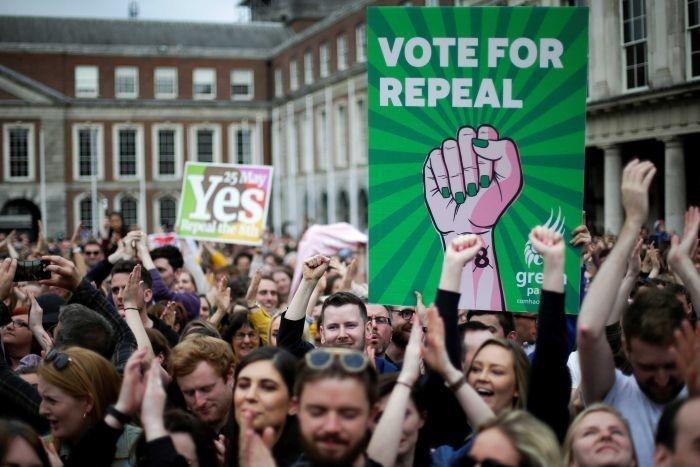Ireland Referendum: Big Victory, Many Intersections

Image Coutesy: ABC
The results in the Irish referendum, on repealing the prevailing ban on abortions except for rare extenuating circumstances, is momentous in many ways. The overwhelming mandate from over two-thirds of the electorate is itself highly significant, and took many observers by surprise. Support for the ‘Yes’ campaign, despite obvious weight added by young voters, broadly reflected national average percentages across almost all demographics, age (only the above 65 age group voting No, with over 90 percent of 18-24 year-olds voting Yes), urban- rural, or regional, with only one constituency, Donegal, marginally voting against the trend.
The referendum results will now trigger a change in Ireland’s current law, which gives equal rights to the foetus and the mother. This 1983 law, then supported by both major political parties in Ireland in expectation of a populist boost, had been ‘clarified’ in 1992 as allowing abortions in case of imminent danger to the mother’s life including from suicide. This ruling by the Irish Supreme Court in the so-called X-case involved a 14-year old girl, pregnant as a result of rape, who was finally allowed to travel to England after a public outcry over the attorney general’s refusal to permit her journey. The tragic 2012 case of Indian dentist Savita Halappanavar was the latest trigger. Fearing a miscarriage posing a serious danger to her, she requested an abortion, but was denied one on the grounds that her life was not in danger; advanced sepsis took her life a week later, which the coroner’s inquest declared a “medical misadventure.” Savita’s smiling face figured prominently in the Yes campaign, and chants of “Savita, Savita” rent the air as the referendum results were announced. The new abortion law soon to be enacted in Ireland may even be named after her.
Many commentators and ‘No’s campaigners had expected a much closer result and, importantly, a more divisive campaign and voter response bringing to the fore deep schisms in Irish society, akin to the Brexit referendum in the neighbouring UK. In fact, all efforts at fomenting divisiveness came only from the No campaign, strongly supported by conservative Catholics in the US, which has a large and influential expatriate Irish community with deep roots in the mother country. But Ireland’s voters gave a resolute, progressive and forward-looking mandate, cheerfully and determinedly defying traditionalists and the Catholic Church in Ireland and the rightward shift seen in recent times in large parts of Europe and the US. President Trump has not only closed down all aid to international projects advocating planned parenthood including possible termination of pregnancies, but is also now planning domestic ‘gag’ legislation to prohibit medical practitioners in the US from even discussing possibility of abortion.
The Yes vote appears to mark an almost seismic social transformation in the formerly deeply conservative and Catholic Ireland, but is in fact the culmination of rapid yet deep-rooted changes in Irish society over some time. Ireland voted just a few years ago to legalise gay marriage, the first in the world to do so, and elected an openly gay son of an Indian immigrant and white Irish mother, Leo Varadkar, as the country’s Prime Minister or Taoiseach, who led his Party Fine Gael’s campaign for a Yes vote and has described the referendum results as a “quiet revolution taking place in Ireland… over the last couple of decades.” The rival conservative Fianna Fail was the only major political party to campaign No, which is expected to impact it negatively in the next general elections.
The Irish abortion referendum also intersects with several other political and cultural issues in the Republic of Ireland, in Northern Ireland and its parent the United Kingdom, as well as further afield in the EU.
The results of the referendum in Ireland, and its precursor liberalising trends, have focused attention on the growing conservative and reactionary tendencies in Europe, especially in the newer Eastern European member countries, but also in Northern and Western Europe. Ireland has shown that socially progressive, modernising impulses are still strong and can overcome retrograde political movements. Ireland is a shining contrast to the hyper-nationalism casting its shadow across Europe. Back in 1998, the Good Friday political settlement between the British government, the (mostly Protestant) unionists in Northern Island and the (mostly Catholic) republicans including the militant Sinn Fein, with the tacit support of the Irish Republic, required the latter to endorse it in a referendum, in effect, dropping its claim for unification of the North and South. A referendum amending Articles 2 and 3 of the Irish Constitution was endorsed by over 90 per cent of Irish voters. Article 3 is particularly noteworthy. It enshrined a vision of Ireland, defined not as a territory unifying North and South and, implicitly, Protestant and Catholic under a Catholic majority, but to “unite all the people of the… island of Ireland, in all the diversity of their identities and traditions, recognizing that a united Ireland shall be brought about only by peaceful means with the consent of a majority of the people.” India itself could learn a lesson or two from such a vision, which may, in the initial years of independence, have resonated with its own vision of the Indian Union, but which, today, is drifting towards a hard, territorially defined India, averse to recognising religious or cultural diversity.
A very different vision from the territorially-defined hyper-nationalism expressed in the Brexit vote in the UK, especially in England and marginally in Wales, as distinct from Scotland and Northern Ireland. Ironically, the abortion referendum in predominantly Catholic Ireland will now put great pressure on the majority Protestant forces in Northern Ireland, whose own abortion laws are close to the erstwhile position in the Irish Republic, to enact similar laws north of the border, or risk humiliating trips to the South. The UK Government led by Theresa May, under pressure from her Unionist coalition partners – without whom she has no majority – has already refused to pass reform laws in Northern Ireland till such time as a new provincial government is constituted in that territory.
The vexatious Brexit negotiations, involving the troubling question of a hard or soft border between Northern Ireland and the Republic to the south, are also once again in focus. In the unlikely event a soft Brexit, with a continued customs union, common market and even open borders between the UK and the EU, does come about, people in Northern Ireland may have little to worry about. But if a hard Brexit is decided upon, calling for sealing the borders between North and South in Ireland, the successful abortion referendum in the Irish Republic adds another factor complicating matters for populations north of the border.
Europe, the US and the world have a lot to learn from the Irish referendum. And there is not one, but are many lessons.
Get the latest reports & analysis with people's perspective on Protests, movements & deep analytical videos, discussions of the current affairs in your Telegram app. Subscribe to NewsClick's Telegram channel & get Real-Time updates on stories, as they get published on our website.























